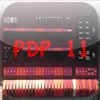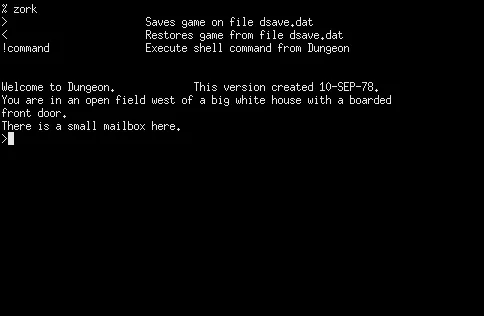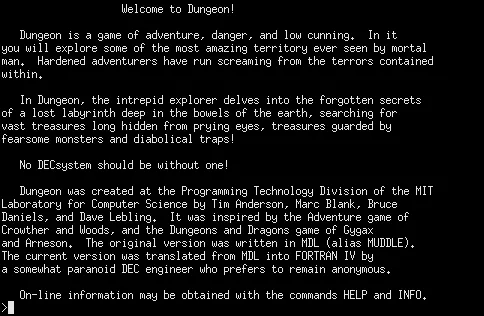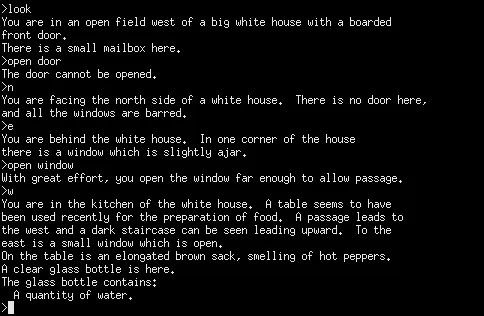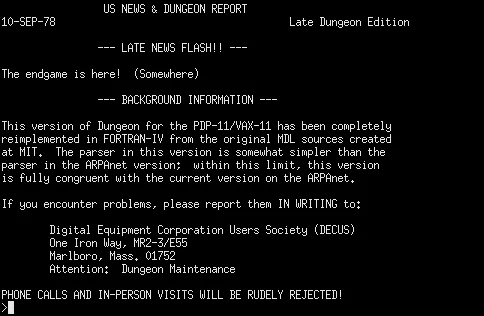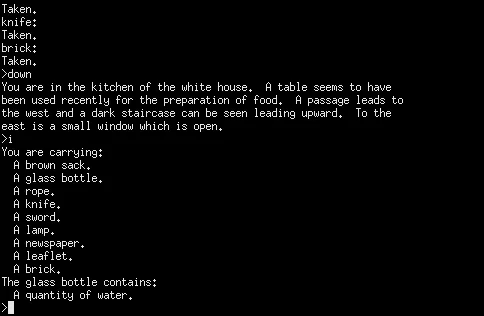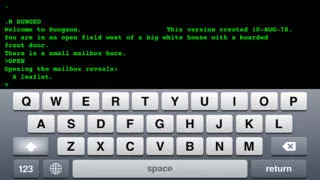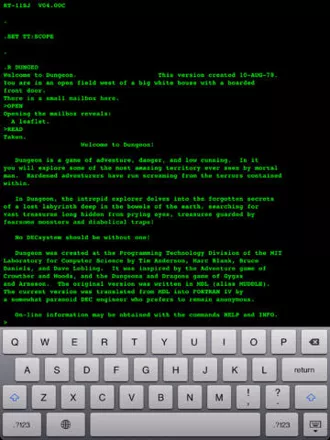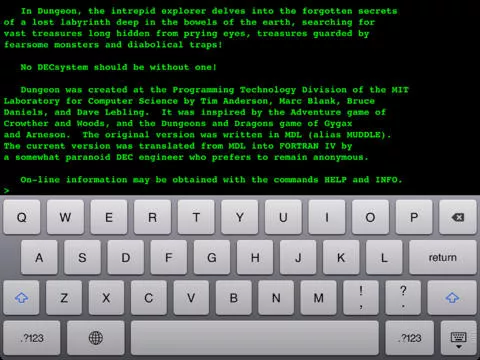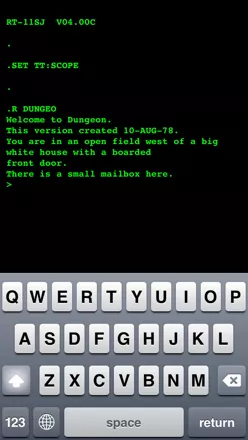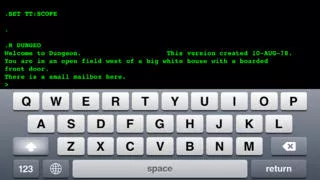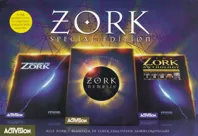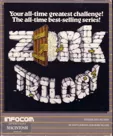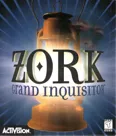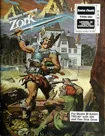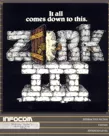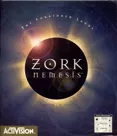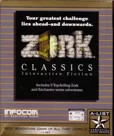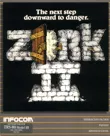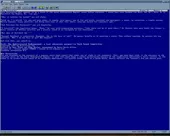Zork
Description
A bunch of university kids at MIT (soon to be the guiding lights behind Infocom) played the pioneering cave-crawling treasure-hunting text adventure ADVENTURE and thought "Hey, we can improve on that!" Around June of 1977 they pooled their collected creative juices and cranked out a sassy successor in MDL on a PDP-10. It didn't have a name, so they just used a hacker nonsense word in place of one temporarily -- "Zork."
This game presented the next in a long line of treasure-hunting protagonists with a vast Great Underground Empire to explore -- provided their lantern didn't run out of juice -- and whimsical obstacles among the Flatheadian ruins forced players to employ lateral thinking to collect wondrous treasures worth thousands of zorkmids... and deposit them in the trophy case back aboveground. If this sounds familiar, it's no coincidence -- Zork/Dungeon is the primordial clay from which the first three games of the Zork series were fashioned, following some extensive refitting of set pieces -- due to the game's enormous size of one megabyte, making it commercially available for home microcomputers, with their limited memory and storage capabilities, was not considered a viable plan in 1979... until they came up with the idea of segmenting the giant dungeon up.
(Ports of this game also exist for VMS, the Acorn Archimedes, and the Z-code, TADS and GLK software platforms.)
Groups +
Screenshots
Promos
Credits (Mainframe version)
4 People
| Written by |
Reviews
Players
Average score: 3.1 out of 5 (based on 16 ratings with 0 reviews)
Be the first to review this game!
Discussion
| Subject | By | Date |
|---|---|---|
| This is ZORK! | S Olafsson (60591) | Jul 16, 2017 |
Trivia
Development
Though the plan was to use the aboveground area and immediate underground vicinity of the house as the basis for Zork I and everything else for Zork II, an onslaught of fresh new puzzle ideas delayed the use of some of the best areas until Zork III and a couple of portions of Mainframe Zork didn't end up being used in a game for the home market until finally, in 1984, being incorporated into Sorcerer.
Original version
As with Space War, Rogue and ADVENTURE, the program was made as an intellectual exercise of sorts before a home computer game market existed... as such, it could be run freely (after all, why copy-protect software that can only be run on a handful of expensive institutional minicomputers?) by anyone who connected to host 70 on the ARPAnet -- a relatively limited and restricted group of military and academic elites back in '79.
The source was stored in an encrypted fashion but someone (known to the annals of history only, presumably for legal reasons, as "a somewhat paranoid DEC engineer who prefers to remain anonymous") was clever or bored enough to both procure and decrypt them. Since MDL only ran on the PDP-10, this anonymous engineer took on the tremendous feat, uncredited, of translating Zork from MDL to the more limited but far more portable language FORTRAN IV... whose distribution in turn was ported by others to FORTRAN 77 in 1981, and eventually to C in 1991... an underground chain leading to all home versions used as source material for this game entry.
Title
After considering turning their free Zork online game into a marketable product, the MIT gang planned on re-branding it Dungeon, a name with perhaps less personality but a more immediate suggestion of its contents; two different pressures would convince them to revert to their original name. From one side, they determined that the DEC hacker who purloined their source code was distributing his version under the name Dungeon; on the other, they were subjected to legal pressure from an unnamed rising RPG company who didn't want the public to become confused over the copyright status of certain game properties involving Dungeons.
Sticking with Zork turned out to be the least complicated way to maintain a distinct identity for their product, and after verifying that they wouldn't be confused or in conflict with Mattel's "Mighty Zork" motorcycle model or the Zork Hardware Company of El Paso and Albuquerque, they were on their way to making Zork the most famous piece of hacker jargon in computer gaming history.
Analytics
Upgrade to MobyPro to view research rankings!
Related Sites +
-
Dungeon @ Baf's Guide to the IF Archive
Information on and free, legal download of various versions of Mainframe Zork (as well as original MDL source code!) -
Dungeon @ iFiction.org
Play the game through your browser.
Identifiers +
Contribute
Are you familiar with this game? Help document and preserve this entry in video game history! If your contribution is approved, you will earn points and be credited as a contributor.
Contributors to this Entry
Game added by Pseudo_Intellectual.
Additional contributors: LepricahnsGold, Patrick Bregger.
Game added September 14, 2007. Last modified July 25, 2024.
